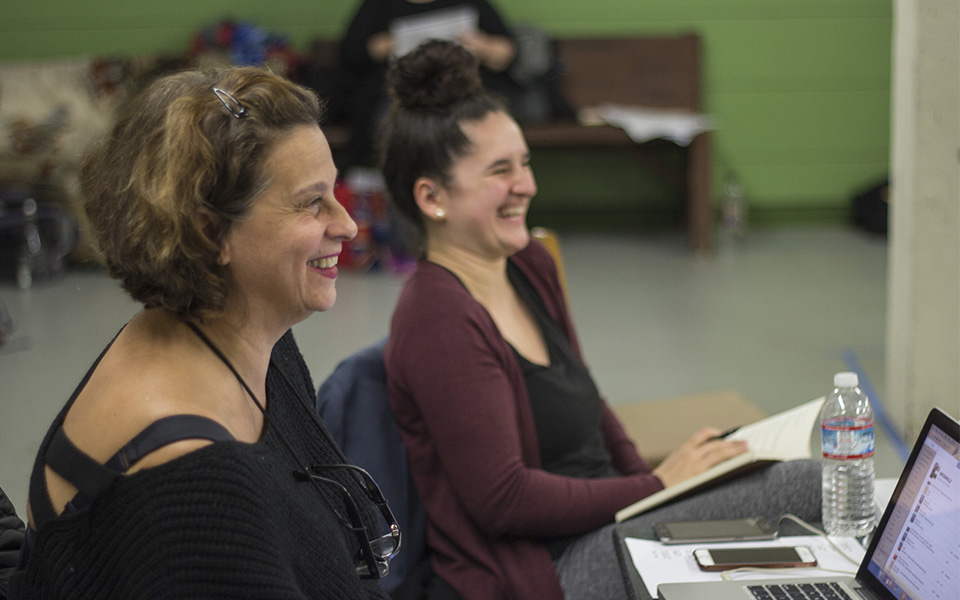An interview with director Elizabeth Huffman
The final show in our 34th Season, Watsonville: Some Place Not Here, is about to make its way to our main stage! And with it comes a new team of artists and producers to tell this story. The newest of which is Director Elizabeth Huffman. Although new to the production team, she is no stranger to Milagro, having directed both American Night (2015) and the five-time Drammy Award-winning Oedipus el Rey (2012). We got a chance to sit down ask her a few questions on her vision for the show, and what we can expect come May.
Please tell about your vision for Watsonville: Some Place Not Here, and about your initial thoughts on the script.
My first thought after the first read was “Oh my lord, what have I just agreed to take on?!” I knew immediately that that this play was going to demand a huge amount of research on my end…research which has since filled my days and occupied my late nights and probably will continue to do so up to opening night. A play of this scope requires that I fire up all of my theatrical imagination of how to stage such a complicated story in this small theatre. Also I was deeply moved by Cherríe Moraga’s writing, which is a masterful balance of poetry and hard hitting realism. I quickly saw that I would have to tap into my classical experience to unlock the text; at the same time I wanted to explore the use of contemporary multi-media avenues to blend the realistic and theatrical threads that co-exist throughout the play.
Tell us about your previous directing experience at Milagro, and how/if that influences your work on Watsonville.
This is my third show here at Milagro having previously directed Oedipus el Rey by Luis Alfaro and American Night by Richard Montoya. I also developed my solo show Not My Revolution here, through the generosity of José González, who was my first friend when I came to town in 2009 and who has indeed been a friend to so many in this theatre community. This theatre is like mi familia. I have worked with many of the actors here or I have seen their work onstage and wanted to work with them. That familiarity makes the collaborative process more productive when one already has a solid working relationship. I was able to come in with virtually no prep time secure in the knowledge that these actors would immediately jump in with their work ethic, experience and insights to fill in the many blanks that I had when I came on board and they have done just that. I am also very fortunate in the design team who have graciously re-shuffled their former designs to embrace a new director’s vision and we are all now moving forward in our creative process together.
What are the main themes of the show, and how are they realized in your vision of the performance?
The play follows along three interweaving themes of a political reality, personal faith, and the desire for love. The central plot follows the true story of the Watsonville strike and the extraordinary tenacity of the Mexican cannery workers who held out for better pay and working conditions for nearly two years, putting themselves and their families under enormous stress, especially as the government is threatening the deportation of illegal workers and their families…a political issue that is of course still raging in our country today. Their faith and the blossoming love story in the play are the coping mechanisms that give the characters the strength to endure profound loss, grief, and fears for their family’s future. This is a big play, containing the elements that I love most in theatre piece: gorgeous language, political relevance, humor, music, a connection to gods, and spiritual visions…and just to make things even more thrilling, a potent reminder from Nature that we are all vulnerable when she decides to make an appearance. What’s not to love? My task ahead is to weave those threads into a human and moving tapestry that takes the audience on a journey of empathy and self reflection that encourages them to examine their own place in Watsonville.
What personal experiences do you as a director bring to a production, and particularly to show like Watsonville?
I think all of my years of directing big classical plays make me capable of handling the complex aspects of storytelling necessary to bringing a play like this to life.
You were a last minute addition to the creative team after the previous director had to step down. How did you come to be the next director?
I was in London for a holiday, following two months in Germany where I had directed a play of mine with Bremer Shakespeare Company. I was coming back to Portland and wrote to Roy to check in with him on what was happening in Milagro world and we agreed that when I got back we would hook up and catch up. I literally had been back in town for one night before he sent me an email asking me to call him asap, that he needed a director to step in and would I be available to start at once?…and well…Milagro is family, you know? It was a beautiful way to come home.
Watsonville: Some Place Not Here by Cherríe Moraga runs May 3 – 26, 2018.
Learn more about the production or get tickets.

